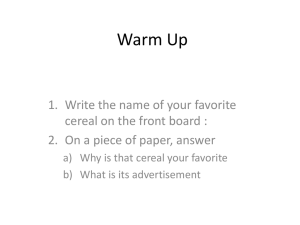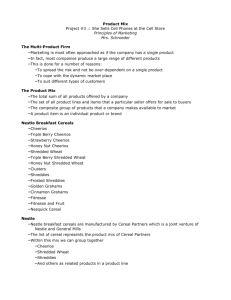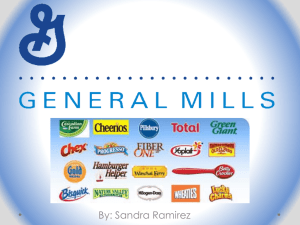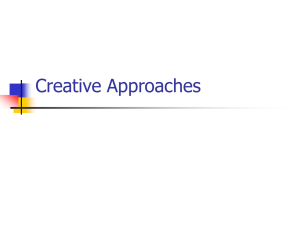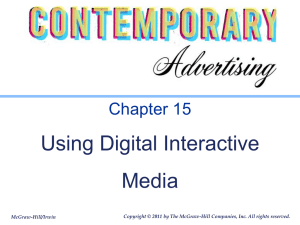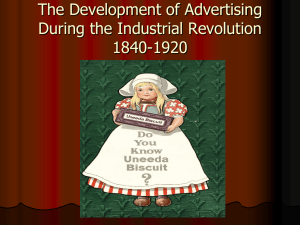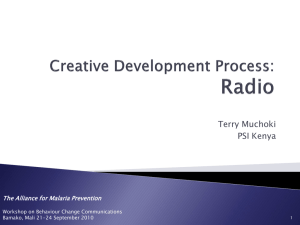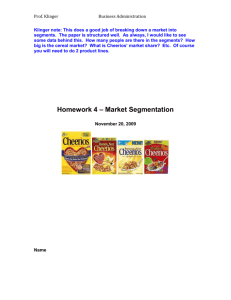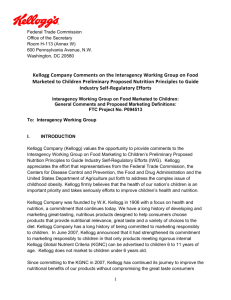The Breakfast Cereal Industry
advertisement
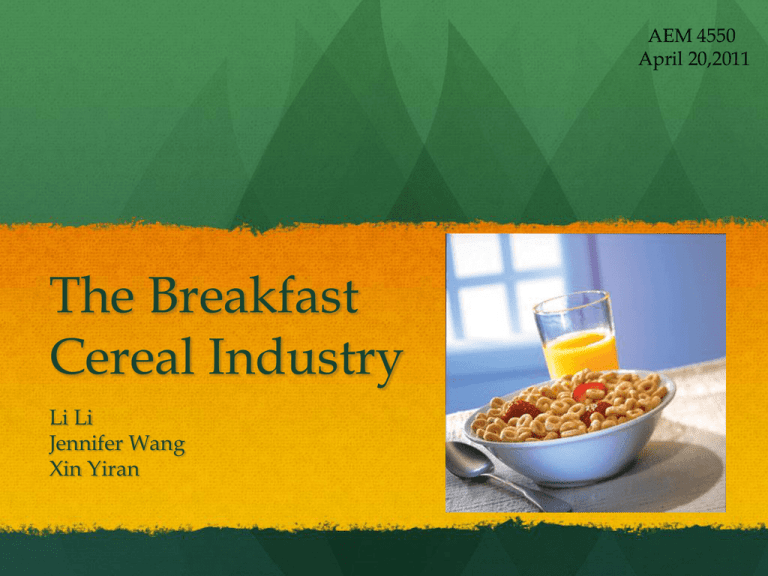
AEM 4550 April 20,2011 The Breakfast Cereal Industry Li Li Jennifer Wang Xin Yiran Outline Introduction Industry Analysis Advertising Strategies Investment & Recommendation Why the Breakfast Cereal Industry? • “Breakfast is the most important meal of the day” – Metamorphosis, Franz Kafka, 1915 Body fasts for 6-9 hours the night prior – “breakfast”- breaks the fasting • 93% of respondents reported household use of cold cereal, 68% - hot cereal (Experian Simmons NCS data) • “Americans buy 2.7 billion packages of breakfast cereal each year. If laid end to end, the empty cereal boxes from one year's consumption would stretch to the moon and back. “ – Cerealizing America: The Unsweetened Story of American Breakfast Cereal Industry Analysis Industry Definition US Cereal Production industry takes raw materials like corn, wheat, flour, and sugar from different sources and turns these ingredients into ready-to-eat cereals, hot cereals, and cereal bars Main activities involve manufacturing: - cold and hot breakfast cereal - breakfast and snack bars Industry Structure Industry Structure HHI = 1822.86 C4 = 76% Mergers will be challenged since HHI >1800 Industry is an oligopoly with four main firms Industry Structure Major Companies Other 24% Kellogg Company 34% PepsiCo Inc. 8% Ralhorp Holdings Inc. 14% General Mills Inc. 20% Industry Analysis Life Cycle Stage Mature Barriers to Entry High Capital Intensity High Technology Change High Competition Level High Regulation Level Heavy Key Success Factors Product Differentiation Cost Control Adaptability EOS Supply Contract Industry Trend Expected Slower Growth -High price of wheat -Increasing price of coarse grains Attitude change towards health consciousness e.g. Lower sugar and cholesterol, more fiber More convenient product to accommodate busy lifestyle e.g. Breakfast bars Employment Average Wage ($) 2006 2007 2008 2009 2010 64183.4 60770.7 61061.9 62173.3 63730 Distribution Imports & Exports Insignificant as major companies own facilities internationally Major trading countries: Canada & Mexico Imports are growing while exports are declining Primary Advertising Methods Persuasive Advertising Informative Advertising Memory Jamming Celebrities Humor Emotional Appeal Promotions & Giveaways Segmentation Persuasive Advertising Persuasive advertising is effective for experience goods Honey Bunches of Oats – “There’s a box here with your name on it!” Honey Bunches of Oats Commercial Informative Advertising Direct Signaling Educational. Tells the consumer the health benefits Cheerios: Informative Advertising Indirect Signaling Match product to buyers effect Saturday morning cartoons Measurable change in consumer preference and market share of advertised products E.g. Kellogg’s high fiber cereal Memory Jamming Repeated commercial plays Signaling efficiency effect Recognizable Mascots Catchy slogans and Jingles: “They’re Gr-r-r-eat!” – Kellogg’s Frosted Flakes “Silly Rabbit, Trix are for kids!” – Trix Memory Jamming Celebrity Endorsement Celebrities can increase brand equity Wheaties: “The Breakfast of Champions” Need to be careful of impact on brand Michael Phelps Humor Keeps audience attentive Difficult to appeal to everyone because people have different preferences Cocoa Puffs: Emotional Appeal • Form stronger connection to consumer • General Mills used special promotion boxes with retro designs • Seeks to motivate parents, by using nostalgia Cheerios Commercial Promotions and Giveaways Incentive for the consumers to buy the cereal Draws attention Include a toy or opportunity to win Kashi Kick-Off Event at Cornell Segmentation Many commercials targeted children with highly animated commercials Saturday morning cartoons is perfect time to target the young audience Cap’n Crunch: Segmentation After FTC’s warnings, cereal companies have shifted toward targeting the adult audience More health-conscious Multi-Grain Cheerios: Segmentation General Mills increased Hispanic-targeted media spending in 2009 and 2010 Cinnamon Toast Crunch particularly appeals to Hispanics Baby Boomers- another key market Highest per capita cereal consumption by people over 55 Seek to add fiber to diets (Fiber One, Multi-Grain Cheerios) Cheerios Targeted Toward Both Children and Adults Advertising Mediums TV Product Placement Print Online Television Advertising Advertised mostly on Mon, Tues, Fri Mostly Advertised during 7-8 PM, 9 AM Dollars spent most on Cheerios, Fiber One, MiniWheats Largest Ads Spending during July, Aug Spent most on cold cereals especially the healthy category such as Honey Nut Cheerios, Fiber One, Multi-Grain Cheerios, but highest average dollar spent per advertisement on hot cereals Television Advertising Uses segmentation to target different audience - More colorful, energetic, and animated commercials for young children - Use character mascots to connect to kids such as Tony the Tiger, General Mill’s Trix Rabbit - Focuses on nutritional content to target adults Average Advertising Cost per Day of Week Top 10 Brands with the Highest Total Advertising Expenditures Top Program Types to Advertise On Healthy vs. Unhealthy Cereal Popular Program Types to Advertise Healthy Cereal Program Type NEWSCAST (LOCAL ONLY) SITUATION COMEDY TALK SLICE-OF-LIFE Number of Ads 138348 93336 59858 37354 Popular Program Types to Advertise Unhealthy Cereal Program Type Number of Ads ANIMATION(LOCAL ONLY) 18347 CHILDRENS/FAMILY ENTERTAINMENT 4047 SITUATION COMEDY 3976 FEATURE FILM 2956 10 Most Popular Shows to Advertise On Most Expensive Ad Spots for Cereal Ads Show Ad Cost AMERICAN IDOL $ 823,700 GREY'S ANATOMY $ 577,800 AMERICAN MUSIC AWARDS $ 361,100 NCAA Basketball Playoff Game 22 $ 281,100 NCAA Basketball Playoff Game 21 $ 281,100 Product Placement More common with the advent of Internet and TiVo Popular shows feature consumption of certain cereal brands e.g. Frosted Flakes on “Friends” Audience are “forced” to watch the ads Careful not to ‘overdo’ it Effective if it is natural and integrated Product Placement in Days of Our Lives Ad Spending of Top 4 Firms Ad-to- Sales Ratio Comparison Ad-to-Sales Ratio 1.2 times higher than the food sector 3.5 times higher than the average value for all other industries High profit margin Kellogg Co Corn Flakes, Frosted Flakes, All-Bran, Apple Jacks, Crispix, Rice Krispies, Froot Loops, Nutri-Grain Highest Advertising Expenditure Highest Ad-Sales Ratio Focuses on eight top sellers and Kashi cereal Kashi highlights healthy lifestyle, including consuming natural foods and staying active Boston, Portland, LA General Mills Brand Names: Cheerios, Fiber One, Kix, Wheaties, Lucky Charms, Total Invested heavily in R&D and product innovation Target Large Cities e.g. New York, San Francisco, Boston Ralcorp Holdings, Inc. Brand Names: Honey Bunches of Oats, Pebbles, Shredded Wheat, Post Raisin Bran, Grape-Nuts, Honeycomb Acquired Post Both private label and branded cereals New Orleans, Cincinnati, Green Bay PepsiCo Inc. Brand Names: Quaker Foods North America (QFNA), Quaker Oatmeal, Life , Cap'n Crunch Richmond, Jacksonville, Norfolk Perceptual Map Print Advertising More informative (direct) but still persuasive More targeted than TV ads 2008 Less common nowadays 1926 Online Advertising Social media becoming a more popular marketing tool Kellogg’s uses this for Special K and Frosted Mini-Wheats Special K – strong brand – pioneer for new media advertising – weightloss management (support from peers important so social media is a great way to do that) Social Media Brand Equity Crucial in order to stand out among hundreds of brands Makes demand less elastic to price Emotional branding Regulation Regulation level is high and increasing 2007 – Self-regulation of marketing to youth Children's Food and Beverage Advertising Initiative Kellogg said would not promote foods in TV, radio, print or Web site ads that reach audiences at least half of whom are under age 12 unless a serving of the product follows specific guidelines 2008 – Federal Trade Commission published study on food marketing to children and recommended that companies “adopt and adhere to meaningful, nutrition-based standards for marketing their products to children under 12” False Health Claims Kellogg Co. came under scrutiny in 2009 and 2010 because of false health claims in advertisements Frosted Mini-Wheats: “clinically shown to improve kids’ attentiveness by nearly 20%” Rice Krispies: “now helps support your child’s immunity,” with “25 percent Daily Value of Antioxidants and Nutrients – Vitamins A, B, C, and E” FTC delivered strong message – won’t tolerate false health claims Kellogg prohibited from making claims about any health benefit unless backed by scientific evidence and not misleading Recommendation for Management Local newscast is among the cheapest Sports events such as baseball and basketball are expensive Talk show or soap opera as they target more towards women and they control more than 80% of spending Follow FTC regulation, otherwise would be heavily penalized Recommendation for Investment High profit margin Branded revenue likely to increase as the US economy recovers Breakfast bar has great growth potential Videos Honey Bunches of Oats: http://www.youtube.com/watch?v=em9thvkiS7I Cocoa Puffs: http://www.youtube.com/watch?v=xBGpRLjNnzM Cheerios 1:b. http://www.youtube.com/watch?v=pDNgbQbQpA Cheerios 2: http://www.youtube.com/watch?v=aARf-XwDGFg Multigrain Cheerios: http://www.youtube.com/watch?v=IZ9CL4phPk Product placement: http://www.youtube.com/watch?v=oGtig5DiTxc
